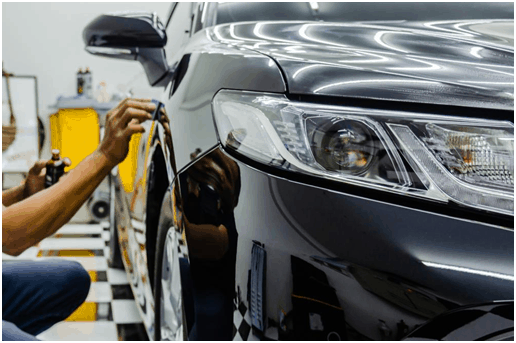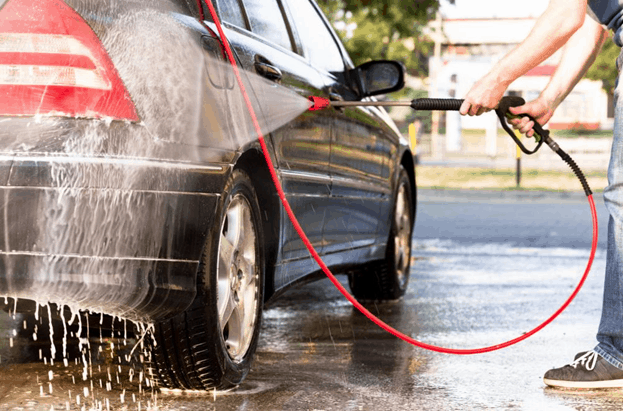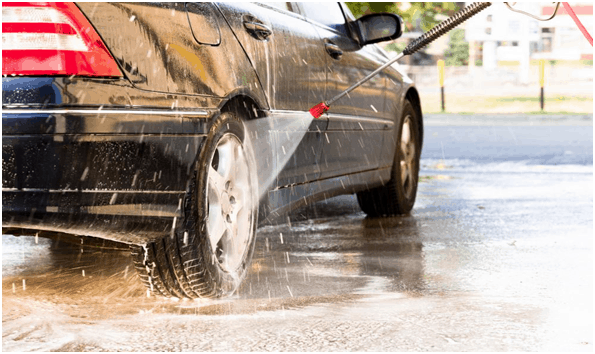What Is Car Ceramic Coating?
Your vehicle is one of your most prized possessions. The thought of protecting your car will make you go to any lengths of the world. Everybody chooses different ways to look after their vehicle and one of these ways includes ceramic coatings.
If you’re looking to protect your car’s paint, rims, headlights and glass then there’s no better option than ceramic coating. You’re probably wondering what it actually is, so, let’s have a look!
What is Ceramic Coating?
Your car’s surface is constantly exposed to different contaminants and types of damage. Things such are dirty rain, mud, brake dust, and grime can stick to your car even right after you clean it. Moreover, the process of washing your vehicle can be pretty boring and extremely time-consuming. To top it off, snow, ice, and even bird shit don’t leave your car alone! This is what the ceramic coating is for! It aims at making your car look as amazing as it did the day you bought it.
Nanoceramic coating is basically another name for ceramic coating. It is a liquid polymer that helps in protecting a vehicle’s surface from damage through contaminants, chemicals, UV rays, cold weather, etc. Over a period of time, these contaminants can penetrate in the non-protective surface of your automobile.
Consistent exposure to these components can cause your car’s paint to oxidize, fade, or peel off. By installing a good quality ceramic coating, you can help block out harmful UV rays in addition to other contaminants. This way, your car’s paint will last longer.
Ceramic coatings are a great option because they tend to last longer than car wax, polish, paint sealants, or other protectant products. Nanoceramic coatings are also mud, dirt, and dust resistant and keep your car in top-notch shape. Moreover, it also helps amplify the shine of your car’s paint, giving it a glossy look.
Types of Ceramic Coatings
Now that you know what ceramic coatings are and how they work, it’s time to find out about the different types of coatings. All those who opt for ceramic coatings for their vehicles are obviously looking for high quality and long-lasting paint protection for their automobile.
While many of these consumers prefer to install the coatings themselves, others search for professionals to get the work done. Hence, there are two grades of ceramic coatings – professional-grade and the DIY grade.
Professional-Grade Ceramic Coatings
Professional grade ceramic coatings are tailored only for professional and skilled use; hence, they are only sold to certified application experts. The professional products are sold individually as commercial-grade products and aren’t available to the general public.
If you opt for professional-grade ceramic coating, you will have various package options. Most of these packages are based on the years of paint protection that products promise to offer. Professional-grade installations can be pricey, but they provide peace of mind as all the prep work will be conducted effectively before the installation begins.
Advantages of Ceramic Pro Installation
Here are some pros of opting for professionals for ceramic coatings.
Convenience – If you have decided on visiting a professional for your auto ceramic coating, you don’t need to worry at all. All you will have to do is drop off your vehicle and pick it up when they are done!
Different Options – Ceramic coating professionals offer various warranty options. You can choose any warranty grade that not only fits your needs but also matches your budget.
Superior Shine – Since these nanoceramic coatings are installed by professionals, you can ensure that the job will be well done. The coating will give your car a gorgeous and elegant shine.
Drawbacks of Ceramic Pro Installation
Here are a few drawbacks of opting for ceramic pro installation
Expensive – While it might not be fair to compare professional grade coatings to DIY ones, it is true that the ceramic pro can be expensive.
Questionable Warranties – Some professional installers can offer questionable warranties. So, just make sure to verify every detail of your installation before you proceed.
Extra Aftercare – Pro-grade installations require the use of specific upkeep products as well as monthly or semi-annual visits to their facility. All of this increases the overall cost of the coating.
DIY Grade Ceramic Coatings
DIY ceramic coatings come with a complete installation package. The prices of these kits usually vary depending on the size of your automobile and the amount of preparation required. However, DIY coating is considerably cheaper than professional-grade coating.
Advantages of DIY Ceramic Coatings
Here are some advantages of DIY ceramic coatings.
Relatively Cheaper – DIY ceramic coatings are estimated to be almost 90% cheaper than professional-grade ceramic installations.
Great Results – DIY ceramic coating can produce exceptional results if done properly, giving your car great shine.
Similar Length of Service – DIY products also provide almost the same level of protection for the same length of time as professional coatings.
Drawbacks of DIY Ceramic Coatings
Here are some drawbacks of DIY ceramic coatings.
Prepping the Vehicle – Unless the prep work that includes fixing dents, scratches, etc., is done correctly, you can’t expect to get good results. Moreover, the prep work requires significant effort, so make sure you’re ready to invest time and energy in the process.
Isn’t for all Vehicles – DIY coatings aren’t meant for all vehicles. If your car’s paint’s clear coat is thin, DIY coatings aren’t going to help much.
How Long do Ceramic Coatings Last?
Anyone who is considering the installation of ceramic coating on their vehicle is naturally concerned with how long it’s going to last. Well, most ceramic coatings can last between two to five years. However, the lifespan of the coating can vary.
Here are a few factors that can influence the longevity of your ceramic coating.
Prep Work
You need to prep your vehicle properly before the installation of nano-coating. This includes cleaning it properly and getting rid of any debris, damage or stains on the surface so that the product can fully bond and cure. If there is any paint damage, scratches or other contaminants on the surface, they will be amplified after the coating cures.
Quality of the Product
So, it’s important to acknowledge that not all ceramic coatings are the same. While the cheap ones are usually made using a generic formula, some expensive coatings are tailored and made from high quality materials that last a long time. All in all, it is obvious that if the product is of a higher quality, it will last longer. On the other hand, if the product is of low quality, it might even scrape away within a few days or months.
Application and Aftercare
First of all, if you are installing a DIY nanocoating, you need to ensure that you apply the product exactly as recommended by the manufacturer. This way, you can help extend the longevity of your ceramic coating. Moreover, the temperature of the area where the product is being applied is also crucial to maintain the coat.
The more humid or hotter the area is, the quicker the product will flash, hence making it really difficult to apply.
Lastly, aftercare is pretty important to keep the coating intact for a long period of time. The aftercare of high-quality products is pretty user-friendly! You can just wash your car every two weeks using the two-bucket car washing method.
How Much Time does it Require to Install Ceramic Coating?
Many people are concerned about the amount of time it will take to get their car coated. The process of applying nano-coating by yourself can take between eight to twenty-four hours to complete. This includes the prep work.
There are various elements that can impact the expected time required to accomplish this task. Here are a few of them.
The Amount of Prep Work
Since the total time period takes into account the prep work as well, you need to take the number of preparations under consideration before starting. If your car has a lot of paint damage, swirl marks, stains, bird droppings or wax deposits, they need to be removed. This will obviously extend the total time of the project. However, if the paint of the car is new, you will only need to wash and polish it slightly. This will reduce the prep time significantly.
Area of Application
So, a nanoceramic coating should be installed on your car in a temperature-controlled environment. If you have the ability to optimize and manage the environmental conditions in which it is applied, you will be able to minimize the number of mistakes and will be able to complete the task faster.
The Products Used
Another important factor to consider is the quality of products used in ceramic coating. It’s crucial to acknowledge that not all ceramic coatings are made in the same manner and offer the same level of protection. In fact, many ceramic coatings require numerous applications in order to protect the vehicle for a long time.
The main component that determines the quality of the ceramic coating is the SiO2 or Quartz percentage incorporated in the formula. The lower the percentage of the aforementioned components, the more the number of coatings required.
So, if you find a high-end product with exceptional quality, you will be able to save a considerable amount of time and produce fantastic results.
The Bottom Line
If you want to protect your car and ensure that it lasts a long time, then ceramic coatings can be a great option for you. You can either opt for DIY ceramic coating or take your vehicle to a professional. We would recommend considering the pros and cons of each type of ceramic coating before making a decision.




